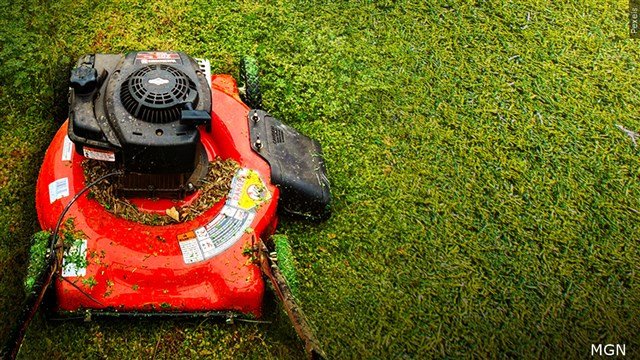Oregon environmentalists tally gas-powered leaf blower, lawn mower pollution, urge move to electric

PORTLAND, Ore. (KTVZ) – With fall upon us and leaf blowers at full blast in neighborhoods across the state, noise and gas fumes are filling the air. Lawn Care Goes Electric: Why it’s time to switch to a new generation of clean, quiet electric lawn equipment, a new report by Environment Oregon Research & Policy Center and OSPIRG Foundation, shows that gas-powered lawn mowers, string trimmers, leaf blowers, chainsaws and other garden equipment generate a large amount of pollution and noise.
Here's their full news release, issued this week:
According to the report’s analysis of U.S. Environmental Protection Agency data, lawn and garden equipment in Oregon emitted an estimated 374 tons of harmful “fine particulate” air pollution in 2020 – an amount equivalent to the pollution emitted by 4 million typical cars over the course of a year. There are currently 3.2 million passenger vehicles registered in Oregon.
“It’s absurd that we have been tolerating so much harmful pollution and noise just to cut grass and maintain landscapes,” said Celeste Meiffren-Swango, state director with Environment Oregon Research & Policy Center. “The good news is, for those who chose to not use a rake or other manual tool, cleaner, quieter electric-powered lawn equipment is capable, affordable and readily available.”
All this unnecessary pollution imposes a significant health cost. The pollutants emitted by gas-powered lawn equipment include fine particulates (PM2.5), ozone-forming nitrogen oxides (NOx) and volatile organic compounds (VOCs), and air toxics such as benzene, 1,3-butadiene and formaldehyde. Exposure to these pollutants in our air has been linked to health problems including asthma attacks, reproductive ailments, mental health challenges, cancer and even premature deaths. Because they burn fossil fuels, gas lawn mowers and leaf blowers also emit carbon dioxide, the leading contributor to climate change.
Fortunately, electric lawn equipment has evolved into an attractive alternative to highly polluting gas-powered tools.
“By allowing fossil fuel consumption to continue, we are choosing to cause harm to the planet and each other,” said Martin Eizik, owner of Multnomah Landscape, a landscaping company based in Portland that uses all electric lawn and garden equipment. “As a small business owner, I’ve invested in cleaner alternatives as one way I can help reduce our dependence on fossil fuels.”
“Electric equipment is comparable to gas powered equipment and it’s only getting better,” said Brendon Wright, Maintenance Manager at Pride + Joy Landscapes in Portland. “It’s much more enjoyable and safe to use than gas powered equipment, and our customers love not having loud noise and noxious fumes when we’re working in their yards.”
The report recommends that local and state governments use electric equipment on public property and provide financial incentives to encourage the widespread adoption of electric lawn equipment. It further suggests that cities and states consider restrictions on the sale and use of the most-polluting fossil fuel-powered equipment.
“It is time for common sense policy to speed the transition away from highly polluting and dangerously noisy gas powered tools like leaf blowers, lawnmowers and trimmers,” said Brian Stewart, Co-Founder of Electrify Now and Quiet Clean PDX. “Cities across the country are eliminating the use of these toxic tools and providing incentives for quiet, clean electric tools that are readily available and cost effective. Portland and other cities in Oregon should enact similar policies to make our communities quieter and safer and protect the health of landscape workers.”
“Air pollution from lawn equipment isn’t some big, distant problem – it’s happening right in our own backyards,” said Tony Dutzik, associate director and senior policy analyst at Frontier Group and one of the authors of the report. “The data in this report shows that emissions from lawn equipment are an important issue in every part of our country.”
“We have a chance to cut down our air pollution problem by switching to cleaner, quieter, readily available electric lawn equipment,” said Charlie Fisher, state director of OSPIRG Foundation. “We shouldn’t accept tons of air pollution and ear-splitting noise as an inevitable byproduct of taking care of our gardens and lawns. We have better ways. It’s time to transition away from dirty gas-powered lawn equipment as quickly as possible.”
The full report is available for download, along with an interactive map with state and county level data for Oregon here.
###
Environment Oregon Research & Policy Center is dedicated to protecting our air, water and open spaces. We work to protect the places we love, advance the environmental values we share, and win real results for our environment. For more information, visit www.environmentoregoncenter.org.
OSPIRG Foundation is an independent, non-partisan group that works for consumers and the public interest. Through research, public education and outreach, we serve as counterweights to the influence of powerful special interests that threaten our health, safety or well-being. More at www.ospirgfoundation.org